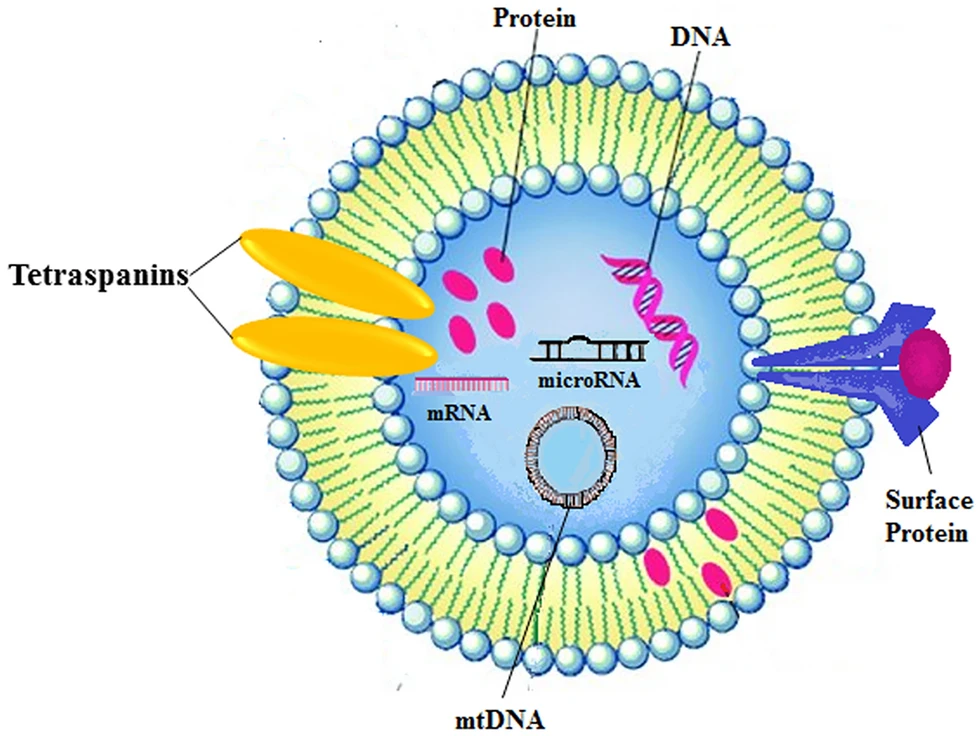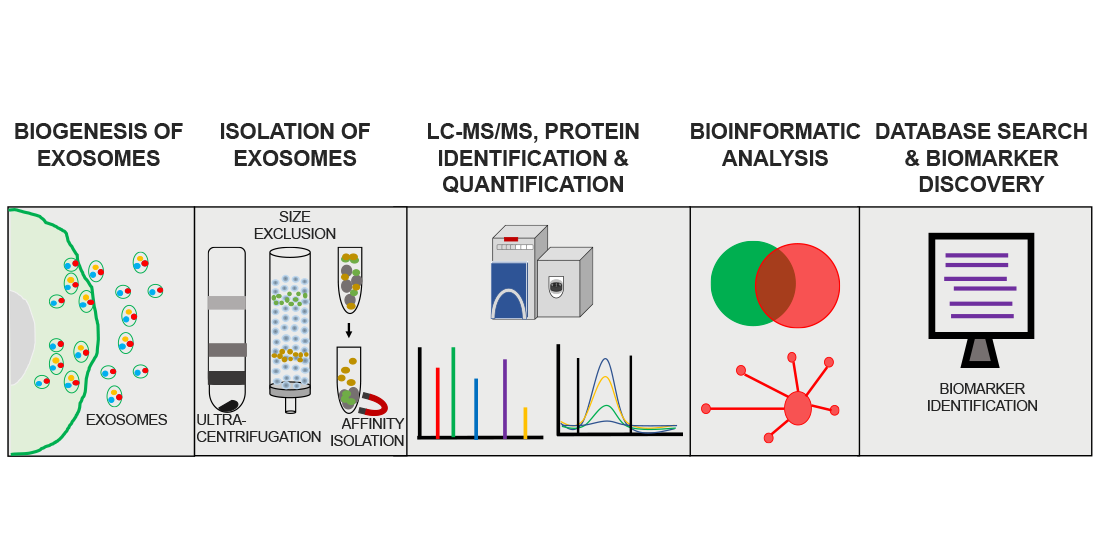Exosomal Proteomic Quantitative Service
Exosomal Proteomic Quantitative Service is a high-throughput quantitative proteomics service based on high-resolution mass spectrometry platforms. It focuses on comprehensive profiling of protein species, abundance, and differential expression within exosomes. By enabling precise quantification of the exosomal proteome, this service supports the discovery of disease-related biomarkers, evaluation of protein drug distribution dynamics, and investigation of intercellular signaling networks.

Jafari A. et al. Med Oncol. 2021.
Exosomes are nanoscale membrane-bound vesicles secreted by cells and are widely present in body fluids such as blood, urine, and saliva. As key mediators of intercellular communication, exosomes carry a variety of bioactive molecules—including proteins, RNAs, and lipids—and are involved in critical biological processes such as immune regulation, tumor metastasis, neural signaling, and stem cell differentiation. Profiling the types, abundance, and dynamic changes of exosomal proteins is essential for understanding their functional mechanisms, assessing disease status, and guiding personalized therapy.
Leveraging advanced chromatographic and mass spectrometric platforms, MtoZ Biolabs offers Exosomal Proteomic Quantitative Service to perform high-throughput and accurate quantitative analysis of proteins in exosomes derived from various body fluids, systematically revealing the composition, differential expression and potential functions of exosomal proteins, enabling researchers to gain deeper insights into intercellular communication mechanisms and advance the clinical translation of exosome-based research.
Analysis Workflow

Mathew B. et al. Brain Sciences. 2021.
The main workflow of Exosomal Proteomic Quantitative Service is as follows:
1. Sample Preparation and Exosome Isolation
Exosomes are extracted and purified from samples such as serum, plasma, or cell culture supernatant using techniques such as ultracentrifugation, ultrafiltration, or size exclusion chromatography.
2. Exosome Characterization and Quality Control
The morphology, particle size, and expression of marker proteins are confirmed using transmission electron microscopy (TEM), nanoparticle tracking analysis (NTA), and Western blotting.
3. Protein Extraction and Digestion
Total proteins are extracted from exosomes and digested into peptides using trypsin.
4. Quantitative Strategy Selection
Depending on the research objective, labeling methods such as TMT or iTRAQ may be employed, or a label-free quantification strategy can be used.
5. LC-MS/MS Analysis
Peptides are analyzed on a high-resolution mass spectrometry platform to obtain accurate mass and abundance information.
6. Data Processing and Bioinformatics Analysis
Specialized software is used for protein identification and quantification, followed by functional analysis such as GO/KEGG pathway enrichment, differential protein screening, and protein–protein interaction (PPI) network construction.
Service Advantages
1. Advanced Analysis Platform: MtoZ Biolabs established an advanced Exosomal Proteomic Quantitative platform, guaranteeing reliable, fast, and highly accurate analysis service.
2. One-Time-Charge: Our pricing is transparent, no hidden fees or additional costs.
3. High-Data-Quality: Deep data coverage with strict data quality control. AI-powered bioinformatics platform integrates all Exosomal Proteomic Quantitative data, providing clients with a comprehensive data report.
Sample Submission Suggestions
Sample Types: Serum, plasma, cell culture supernatant, urine, cerebrospinal fluid, saliva, etc.
Storage Conditions: After low-temperature centrifugation to remove cells and debris, samples should be stored at –80°C. Avoid repeated freeze-thaw cycles.
Additional Notes: If you are unsure about sample submission requirements, please feel free to contact our technical support team.
Applications
Application examples of Exosomal Proteomic Quantitative Service:
Early Disease Screening and Biomarker Discovery
Differentially expressed proteins in exosomes can serve as potential diagnostic and prognostic biomarkers for diseases.
Intercellular Communication and Functional Studies
Reveal the signaling mechanisms of exosomes involved in immune regulation, stem cell differentiation, and tumor microenvironment remodeling.
Protein Drug Development and Delivery Monitoring
Track the distribution of protein therapeutics via exosomal carriers in body fluids to evaluate delivery efficiency and metabolic pathways.
Deliverables
1. Comprehensive Experimental Details
2. Materials, Instruments, and Methods
3. Total Ion Chromatogram & Quality Control Assessment (project-dependent)
4. Data Analysis, Preprocessing, and Estimation (project-dependent)
5. Bioinformatics Analysis
6. Raw Data Files
Related Services
Label-free Exosomal Proteomic Detection Service
How to order?







